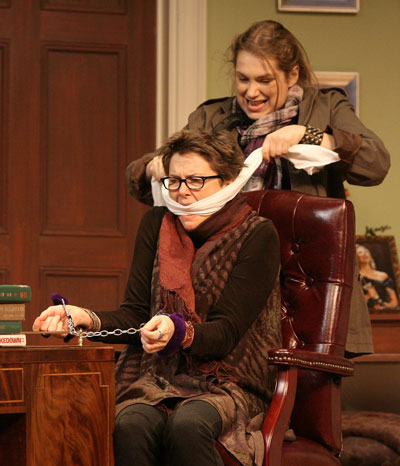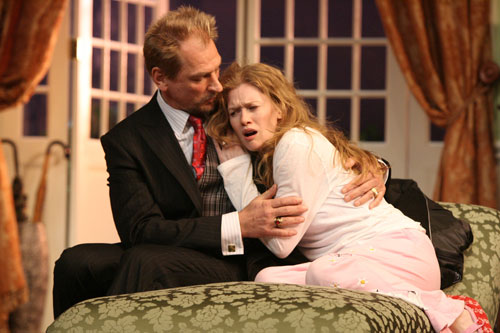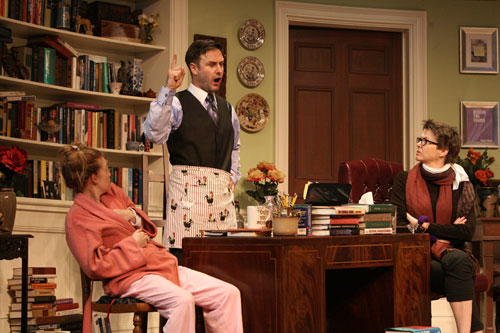
In an age when many well known women are being betrayed by their even more well known husbands, when Wall Street looks totally male, when young mothers are opting out of the work force in droves, and when single mothers of all persuasions are operating without a safety net, it's easy to wonder whether feminism -- first, second or third wave, or post, post-post as Australian Joanna Murray-Smith in her play The Female of the Species now at the Geffen Playhouse in Westwood puts it -- has really had any influence whatsoever.
One could easily watch and exit the play and not be sure when it was taking place: though the polemics and diatribes about women zing around the stage like so many ultimate Frisbees, we could be in any of the last four decades, so little have the basic dilemmas of the modern woman changed. Work versus family is still the elephant in the room, but it's also woman versus woman, woman versus man, man versus man. Murray-Smith skewers every possible iteration of the modern interstices between us, and the things we feel we deserve.
Joanna Murray-Smith interviewed; full interview available here.
Entitlement is a big sub text. Men who became sensitized only to find that women wanted he-men after all, women who became professionals and intellectuals only to find that they wanted to tend the home fires, mothers who didn't realize they had to explain where Pokemons live. And whining about it.
Annette Bening (Margot) is the Germaine Greer avatar (Greer was assaulted by a disaffected student in 2000 who tied her up -- dinner guests arrived to find them in the kitchen) on the eve of her new book being due. Previous efforts include Madame Ovary, and she is only a couple of hundred words into the new one, suffering from writer's block, when she is invaded by a series of interlopers. First an angry former student who feels betrayed (Merritt Wever), then her angry daughter who feels beleaguered (Mireille Enos), then her confused son-in-law who feels neglected (David Arquette), then an angry cab driver who is resentful (Josh Stamberg), and finally her venal publisher who is impatient (Julian Sands) -- all of whom seem to take issue with everything Margot stands for.
Greer claims not to have seen or read the play.

Annette Bening and Merritt Wever. Photo by Michael Lamont.
As played convincingly by Bening (whose feminist cred, post, or otherwise, must be maxxed this week as the numbered and pictured images of her husband's former girlfriends have studded even the pages of the august NYT Book Review), Margot is ever holier than thou, even after the testimonials of all these lost wayfarers, sure that being an intellectual who doesn't worry about the little guy or girl but only the big picture is still what she is meant to be. The fact that wives and husbands and mothers and students poke holes in her shifting trajectories of thou-shalt-nots means less to her than whether she can fix upon the next best-selling title. She is not convinced that she has been wrong, or wronged.
The farce, directed by Geffen artistic director Randall Arney, is very funny. Each character's entrance is followed by a monologue declaration of rights -- stand-up in a circle -- after which the assembled have at them. Everyone gangs up on Margot, but she's tough enough, or blind enough, to withstand it. In the end, though we have laughed heartily at the foibles of feminism and intellectualism, we are left feeling a bit sorry for ourselves. If the very smart people and the men and women who've benefited from education and years of therapies and literature cannot manage to figure out the balance between work and life, who can? As one character says, old feminists are the problem, not men. Hmmmmm. The cohesiveness of the superior ensemble cast makes 95 minutes without intermission go by swiftly. It was meant to be Broadway-bound, and I see no reason why it cannot be. Firmly in the mold of the free-for-all of Gods of Carnage, it has something, literally, for everyone to latch onto.

Julian Sands and Mireille Enose. Photo by Michael Lamont.

Mireille Enos, David Arquette and Annette Bening. Photo by Michael Lamont.
